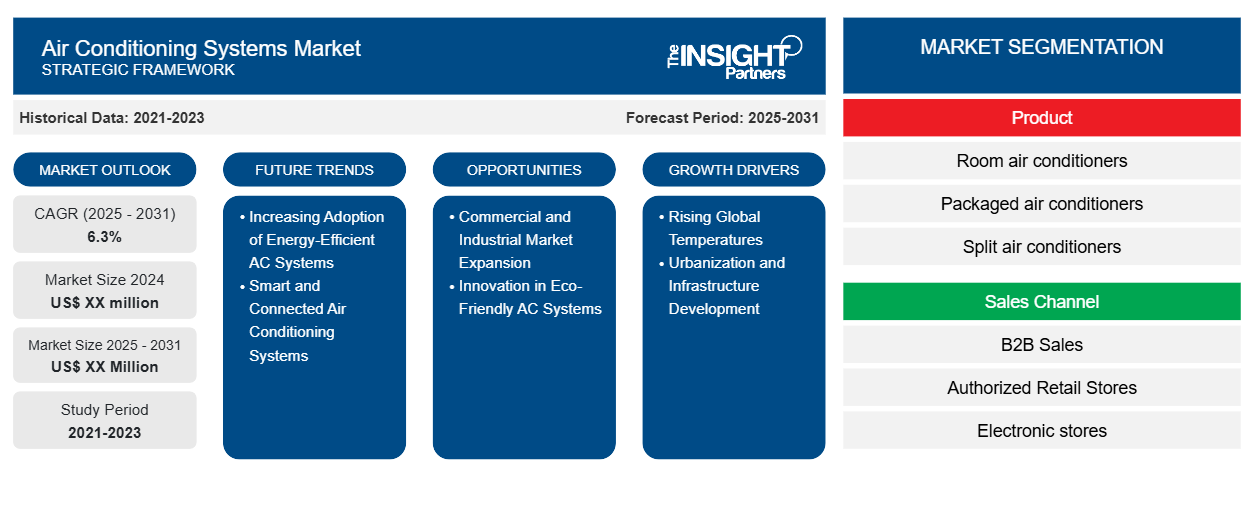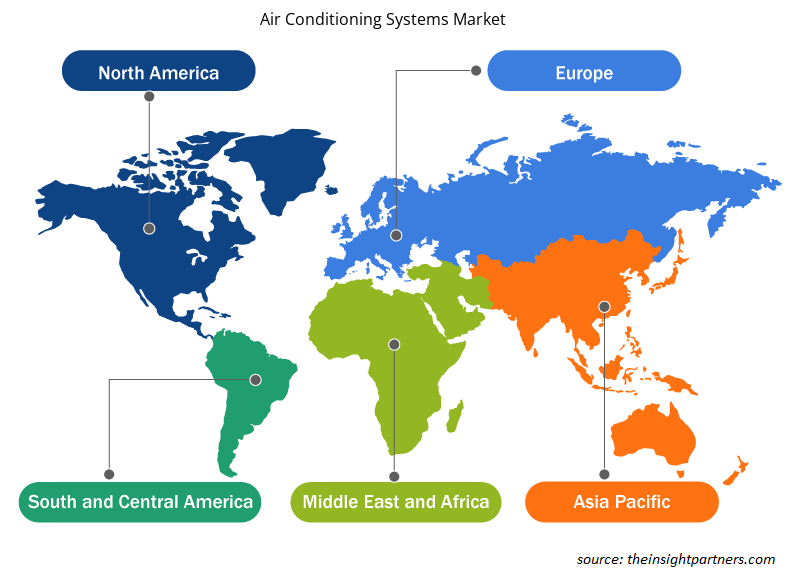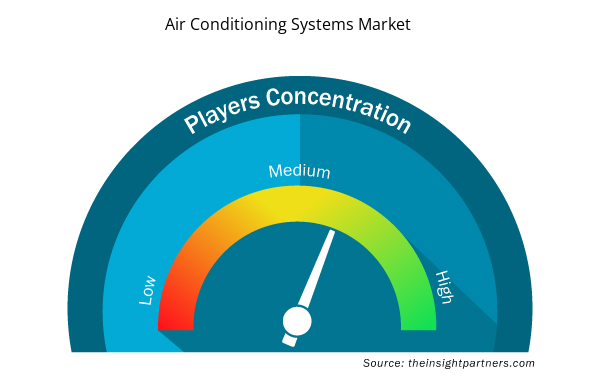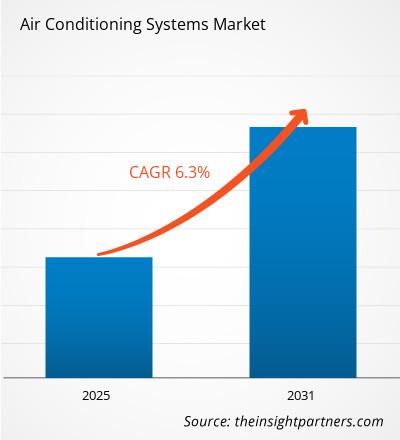The Air Conditioning Systems Market is expected to register a CAGR of 6.3% from 2025 to 2031, with a market size expanding from US$ XX million in 2024 to US$ XX Million by 2031.
The report is segmented by Product (Room air conditioners, Packaged air conditioners, Split air conditioners, Mini split air conditioners, Ductless air conditioners, Terminal air conditioners, Central air conditioners, Portable air conditioners, and Packaged central air conditioners); Sales Channel (B2B Sales, Authorized Retail Stores, Electronic stores, and Online); and End-Use (Industrial, Residential, and Commercial). The global analysis is further broken-down at regional level and major countries. The Report Offers the Value in USD for the above analysis and segments.
Purpose of the Report
The report Air Conditioning Systems Market by The Insight Partners aims to describe the present landscape and future growth, top driving factors, challenges, and opportunities. This will provide insights to various business stakeholders, such as:
- Technology Providers/Manufacturers: To understand the evolving market dynamics and know the potential growth opportunities, enabling them to make informed strategic decisions.
- Investors: To conduct a comprehensive trend analysis regarding the market growth rate, market financial projections, and opportunities that exist across the value chain.
- Regulatory bodies: To regulate policies and police activities in the market with the aim of minimizing abuse, preserving investor trust and confidence, and upholding the integrity and stability of the market.
Air Conditioning Systems Market Segmentation
Product
- Room air conditioners
- Packaged air conditioners
- Split air conditioners
- Mini split air conditioners
- Ductless air conditioners
- Terminal air conditioners
- Central air conditioners
- Portable air conditioners
- Packaged central air conditioners
Sales Channel
- B2B Sales
- Authorized Retail Stores
- Electronic stores
- Online
End-Use
- Industrial
- Residential
- Commercial
Geography
- North America
- Europe
- Asia-Pacific
- South and Central America
- Middle East and Africa
Customize This Report To Suit Your Requirement
You will get customization on any report - free of charge - including parts of this report, or country-level analysis, Excel Data pack, as well as avail great offers and discounts for start-ups & universities
Air Conditioning Systems Market: Strategic Insights

- Get Top Key Market Trends of this report.This FREE sample will include data analysis, ranging from market trends to estimates and forecasts.
Air Conditioning Systems Market Growth Drivers
- Rising Global Temperatures: The increasing global temperatures, driven by climate change, are a key driver for the air conditioning (AC) market. As summers become hotter and heatwaves more frequent, demand for reliable cooling solutions has surged. This is particularly evident in regions experiencing extreme temperature fluctuations, leading to greater adoption of air conditioning systems for residential, commercial, and industrial use.
- Urbanization and Infrastructure Development: Rapid urbanization and infrastructure development in emerging economies are fueling the growth of the air conditioning market. As cities expand and the demand for modern, comfortable living and working environments rises, AC systems have become essential in residential buildings, commercial spaces, and large-scale developments, driving market growth.
Air Conditioning Systems Market Future Trends
- Increasing Adoption of Energy-Efficient AC Systems: A growing trend in the air conditioning market is the shift towards energy-efficient systems. With rising energy costs and environmental concerns, consumers and businesses are opting for AC units with higher energy efficiency ratings. The development of inverter technology and the introduction of energy-efficient refrigerants are helping reduce power consumption, thus lowering operational costs and environmental impact.
- Smart and Connected Air Conditioning Systems: The integration of IoT (Internet of Things) and smart technology in air conditioning systems is a significant trend. Smart AC systems allow users to control temperature, monitor energy consumption, and schedule operations via smartphones or voice assistants. These features provide enhanced comfort, convenience, and efficiency, making them increasingly popular among consumers seeking more control over their indoor environments.
Air Conditioning Systems Market Opportunities
- Commercial and Industrial Market Expansion: The demand for air conditioning systems in commercial and industrial sectors presents a significant opportunity. As industries such as retail, hospitality, and healthcare expand globally, there is an increased need for advanced HVAC (Heating, Ventilation, and Air Conditioning) systems for large-scale buildings, office spaces, and factories, where climate control is crucial for both comfort and equipment performance.
- Innovation in Eco-Friendly AC Systems: The growing emphasis on sustainability offers opportunities for innovation in eco-friendly air conditioning systems. Consumers are increasingly interested in systems that use environmentally friendly refrigerants, reduce energy consumption, and have a smaller carbon footprint. Manufacturers focusing on developing green technologies, such as solar-powered AC units or systems that use natural refrigerants, are well-positioned to capture this growing market segment.
Air Conditioning Systems Market Regional Insights
The regional trends and factors influencing the Air Conditioning Systems Market throughout the forecast period have been thoroughly explained by the analysts at Insight Partners. This section also discusses Air Conditioning Systems Market segments and geography across North America, Europe, Asia Pacific, Middle East and Africa, and South and Central America.

- Get the Regional Specific Data for Air Conditioning Systems Market
Air Conditioning Systems Market Report Scope
| Report Attribute | Details |
|---|---|
| Market size in 2024 | US$ XX million |
| Market Size by 2031 | US$ XX Million |
| Global CAGR (2025 - 2031) | 6.3% |
| Historical Data | 2021-2023 |
| Forecast period | 2025-2031 |
| Segments Covered |
By Product
|
| Regions and Countries Covered | North America
|
| Market leaders and key company profiles |
Air Conditioning Systems Market Players Density: Understanding Its Impact on Business Dynamics
The Air Conditioning Systems Market market is growing rapidly, driven by increasing end-user demand due to factors such as evolving consumer preferences, technological advancements, and greater awareness of the product's benefits. As demand rises, businesses are expanding their offerings, innovating to meet consumer needs, and capitalizing on emerging trends, which further fuels market growth.
Market players density refers to the distribution of firms or companies operating within a particular market or industry. It indicates how many competitors (market players) are present in a given market space relative to its size or total market value.
Major Companies operating in the Air Conditioning Systems Market are:
- Samsung Electronics Co. Ltd.
- Mitsubishi Corporation
- Daikin Industries Ltd.
- Siemens AG
- Panasonic Corporation
Disclaimer: The companies listed above are not ranked in any particular order.

- Get the Air Conditioning Systems Market top key players overview
Key Selling Points
- Comprehensive Coverage: The report comprehensively covers the analysis of products, services, types, and end users of the Air Conditioning Systems Market, providing a holistic landscape.
- Expert Analysis: The report is compiled based on the in-depth understanding of industry experts and analysts.
- Up-to-date Information: The report assures business relevance due to its coverage of recent information and data trends.
- Customization Options: This report can be customized to cater to specific client requirements and suit the business strategies aptly.
The research report on the Air Conditioning Systems Market can, therefore, help spearhead the trail of decoding and understanding the industry scenario and growth prospects. Although there can be a few valid concerns, the overall benefits of this report tend to outweigh the disadvantages.
- Historical Analysis (2 Years), Base Year, Forecast (7 Years) with CAGR
- PEST and SWOT Analysis
- Market Size Value / Volume - Global, Regional, Country
- Industry and Competitive Landscape
- Excel Dataset



Report Coverage
Revenue forecast, Company Analysis, Industry landscape, Growth factors, and Trends

Segment Covered
This text is related
to segments covered.

Regional Scope
North America, Europe, Asia Pacific, Middle East & Africa, South & Central America

Country Scope
This text is related
to country scope.
Frequently Asked Questions
Key players in the air conditioning systems market include Samsung Electronics Co. Ltd., Mitsubishi Corporation, Daikin Industries Ltd., Siemens AG, Panasonic Corporation, Midea Group Cc Ltd, Denso Corporation, Hitachi Ltd., LG Electronics Inc., and Electrolux AB
Some of the customization options available based on the request are an additional 3-5 company profiles and country-specific analysis of 3-5 countries of your choice. Customizations are to be requested/discussed before making final order confirmation# as our team would review the same and check the feasibility
Integration with Smart Grids and Automation Systems is likely to remain a key trend in the market.
The major factors driving the air conditioning systems market are:
1. Rising Global Temperatures.
2.Urbanization and Increasing Infrastructure Development
The Air Conditioning Systems Market is estimated to witness a CAGR of 6.3% from 2023 to 2031
Trends and growth analysis reports related to Electronics and Semiconductor : READ MORE..
1. Samsung Electronics Co. Ltd.
2. Mitsubishi Corporation
3. Daikin Industries Ltd.
4. Siemens AG
5. Panasonic Corporation
6. Midea Group Co. Ltd
7. Denso Corporation
8. Hitachi Ltd.
9. LG Electronics Inc.
10. Electrolux AB

 Get Free Sample For
Get Free Sample For